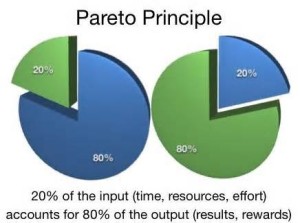Is the 80/20 rule an undeniable fact of life?
A couple of months ago, as an illustration of faith after a painfully detailed ministry potential assessment presentation, Pastor Guy Weatherly quoted from the book of Joshua, Chapter 13, recounting the story of twelve spies sent to collect intelligence and report back to the people after surveying the land God had promised to give them. Of the twelve, ten came back whining about how hard it would be, if at all possible, to possess this land. They compared themselves to grasshoppers, too weak and impotent to challenge the current inhabitants. Only two, Joshua and Caleb, focused on the great bounty of this land with the understanding it was already theirs because God had ordained it. That got me thinking… ten of twelve, or 83%, lacked the vision God intended.
Was the 80/20 rule at play here?
Was the 80/20 rule in fact a biblical principal? Is it really a 90/10 rule as some would say? I continued to consider this and look for examples thinking it would make a great study, but as I began to research the subject, I was pulled in a multitude of different directions. As I begin to write this piece, I have no idea what conclusion I will come to, but I have amassed a tidy stack of interesting facts, so let’s just see where it leads.
Remember the story of Jacob’s twelve sons? Joseph was Jacob’s favorite. Joseph’s ten older brothers (83%) were jealous of him, so they sold him into slavery and lied to their father to cover their devious actions. Rather than seeking the positives, looking at their own shortcomings and striving to emulate the behaviours Joseph displayed that delighted Jacob, they conspired to get rid of him. Had this not happened, and Joseph had become a great manager and administrator for his own people, rather than the Egyptians, his family may have greatly benefited. The jealousy of the brothers however, caused them to take the “easy” path to get what they wanted.
Another example of the 80/20 rule jumped out from the “Life Application Bible Notes” commentary on 2 Kings.
“Only 20 percent of Israel and Judah’s kings followed God. The evil kings were short sighted. They thought they could control their nations’ destinies by importing other religions, forming alliances with pagan nations, and enriching themselves. The good kings had to spend most of their time undoing the evil done by their predecessors.”
Throughout the period of the kings, the people could only count on Godly leadership from one king out of every five. Without Godly leadership, the relationship between the people and God suffered. More than that, the bad kings misdirected the people by introducing idols back into the culture. With this kind of leadership, it is not surprising that 83% of God’s people, 10 of twelve tribes, ended up in rebellion, and finally “lost”.
1 Kings 16:13-19 (NKJV)
Now when all Israel saw that the king did not listen to them, the people answered the king, saying: “What share have we in David? We have no inheritance in the son of Jesse. To your tents, O Israel! Now, see to your own house, O David!” So Israel departed to their tents. But Rehoboam reigned over the children of Israel who dwelt in the cities of Judah. Then King Rehoboam sent Adoram, who was in charge of the revenue; but all Israel stoned him with stones, and he died. Therefore King Rehoboam mounted his chariot in haste to flee to Jerusalem. So Israel has been in rebellion against the house of David to this day.
Examples of the 80/20 (or 90/10) rule in the ministry of Jesus on earth.
Luke 17:12-18 (GW)
As he went into a village, ten men with a skin disease met him. They stood at a distance and shouted, “Jesus, Teacher, have mercy on us!” When he saw them, he told them, “Show yourselves to the priests.” As they went, they were made clean. When one of them saw that he was healed, he turned back and praised God in a loud voice. He quickly bowed at Jesus’ feet and thanked him. (The man was a Samaritan.) Jesus asked, “Weren’t ten men made clean? Where are the other nine? Only this foreigner came back to praise God.”





